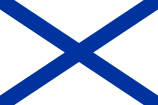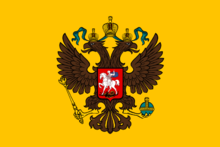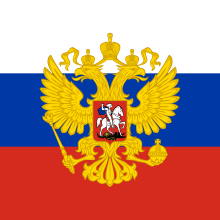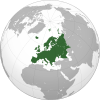This is an old revision of this page, as edited by 58.8.101.243 (talk) at 10:19, 19 February 2010. The present address (URL) is a permanent link to this revision, which may differ significantly from the current revision.
Revision as of 10:19, 19 February 2010 by 58.8.101.243 (talk)(diff) ← Previous revision | Latest revision (diff) | Newer revision → (diff) "Russian Flag" redirects here. For a list of Russian flags, see List of Russian flags. | |
| Триколор Trikolor Tricolour | |
| Use | National flag and civil ensign |
|---|---|
| Proportion | 2:3 |
| Adopted | 11 December 1993 (originally adopted on 28 April 1883, de facto used since 1668) |
| Design | Rectangular tricolour with three equal-size horizontal bands: the upper one is white, the middle blue, and the lower red. |
| Андреевский флаг Andreyevsky flag St. Andrew Flag | |
 | |
| Use | Naval ensign |
| Adopted | 1991 (originally adopted in 1700) |
| Design | White with a blue saltire. |
| Триколор Trikolor Tricolour | |
 | |
| Use | historical |
| Proportion | 1:2 |
| Adopted | 22 August 1991; replaced by current version on 11 December 1993 |
| Design | Rectangular tricolour with three equal-size horizontal bands: the upper one is white, the middle azure, and the lower scarlet |




The flag of Russia (Template:Lang-ru, Flag Rossii), or officially, the State Flag of the Russian Federation (Template:Lang-ru) is a tricolour flag of three equal horizontal fields, white on the top, blue in the middle and red on the bottom. The flag was first used as an ensign for merchant and war ships and only became official in 1896. The flag continued to be used by the Russian Provisional Government even after the Tsar was toppled in the February Revolution and was not replaced until the October Revolution which established a Bolshevik government. From that time period, a red flag charged with communist symbols was favoured over the tricolour. It was not until the collapse of the Soviet Union in 1991 that the tricolour was brought back as the official flag of the new Russian Federation. The modern era flag underwent a slight change in 1993 and has been official since 2000.
History
There was no universally accepted flag for Russia until the middle of the 17th century. The earliest mention of the flag occurs during the reign of Tsar Alexis I, in 1668, and is related to the construction of the first Russian naval ship, the frigate Oryol.
According to one source, the choice of the colours may originate from the Dutch flag, and is related to the nationality of the ship's lead engineer Butler. During the construction, he faced the need for the flag, and issued a request to the Boyar Duma, to "...ask His Tsarist Majesty as to which (as is the custom among other nations) flag shall be raised on the ship." The official response merely indicated that, as such issue is as yet unprecedented, even though the land forces do use (apparently different) flags, the Tsar ordered that his (Butler's) opinion be sought about the matter, asking specifically as to the custom existing in his country. The Netherlands had at the time already settled on its current flag, consisting of red, white and blue stripes, which Butler duly told the Tsar.
This conversation apparently took notice, as the source proceeds to describe the materials bought "overseas" for the ship, and specifically mentions red, blue and white fabric. It is not at all certain, however, that the choice of the colours was affected by the Dutch flag. Another possibility is that the flag repeats the colour choice of the Coat of arms of Moscow; that emblem is alleged by at least one author (Prince Aleksandr Putyatin) to effectively be the first Russian flag.
A different account traces the origin of the Russian flag to Tsar Peter the Great's visits to Archangel in 1693 and 1694. Peter was keenly interested in shipbuilding in the European style, different from the barges ordinarily used in Russia at the time. In 1693, Peter had ordered a Dutch-built frigate from Amsterdam. In 1694 when it arrived, the Dutch red-white-and-blue banner flew from its stern. Peter decided to model Russia's naval flag after this banner by changing the sequence of colours. It eventually became the flag of the Russian empire.
While differing in the circumstances, the two flag origin versions agree on the Dutch flag influence. However, there are historical reasons to doubt that the flag was chosen as late as Peter's reign. One of the strongest arguments against that comes from a German flag book of 1695 by Carel Allard, which is considered to be one of the world's first flag books. Printed only a year after Peter's trip to Western Europe, the book already describes three flags of a similar design noted as belonging to the either Tsar of Muscovy, or Muscovy itself. One of the three flags shown is the tricolour with a double-headed eagle holding a shield in its hands, and wearing a golden crown over both of its heads. Another is the tricolour with a blue saltire over it and the third consists of two white (top left and bottom right) and two red (top right and bottom left) squares, with a blue cross in the middle.
The flag was used as naval and military ensign since at least as early as 1693, and was adopted as a merchant flag in 1705. On 7 May 1883 it was authorized to be used on land. However, it did not become an official national flag (State Flag) until the coronation of Tsar Nicholas II in 1896.
Meaning and origin of the colours
The flag of Russia uses the Pan-Slavic colours of red, blue and white. While there are several theories as to the origin and reason for the choice of the colours, none is currently universally accepted as correct. There is no official meaning assigned to the colours in Russian laws.
The three colours purportedly came from the coat of arms of the Grand Duchy of Moscow, which depict Saint George wearing white (silver) armor, riding a white horse, wearing a blue cape and holding a blue shield, on a red field. According to another version, these three colours were associated with the robes of the Virgin Mary, the holy protectress of Russia.
Yet another interpretation of the three colours is that the order that they are placed in reflected the Russian social system under the monarchy: white represents God, blue the Tsar and red the peasants. Another very common interpretation is the association of colours with the main parts of the Russian Empire: white thus represents Belarus ("White Russia"), blue Ukraine (or Malorossia, "Little Russia"), and red "Great Russia".
A different interpretation associates white with the bright future (where the colour itself is associated with brightness, while its placement at the top - with future); blue with clouded present, and red with bloody past.
In the Swedish-speaking part of Finland, the colours of the modern Russian flag, White, Blue and Red, are interpreted to describe the year of 1809, when Finland became a part of Russia, i.e. White — sv. Vit, Blue — sv. Blå and Red — sv. Röd: Vi Blev Ryssar ("We became Russians").

Variant versions



A variant of the flag was authorized for private use by Tsar Nicholas II during World War I, adding the Romanov eagle on a yellow field in a canton in the top left-hand corner. This variant was never made official state flag.
When the Bolsheviks took power in 1917, the tricolour design was discarded, and a definitive new flag of the Russian Republic (one of the constituent republics of the Soviet Union) was introduced in 1954 (see flag of Russian SFSR), and this remained the republic's flag until the collapse of the Soviet Union in 1991. All of the Soviet Republics' flags were created by introducing a small, but noticeable change, to the flag of the Soviet Union. In this case, the change was an introduction of the left-hand blue band. The previous Soviet design was different, a plain red flag with different variants of the "RSFSR" abbreviation in the canton.
The original flag of 1883 (rather than the black-yellow-white colour combination) was re-adopted by Russia on 22 August 1991. The readoption date is celebrated yearly as the national flag day.
The president of Russia uses a Presidential Standard (Template:Lang-ru), which is officially defined as the tricolour with the Coat of Arms (at this case the two-headed eagle is depicted without the shield) in the middle.
See also
References
- President’s Order No. 2126 of 11 December 1993.
- History of the Russian flag (in Russian)
- Robert Massie, Peter the Great (New York: Ballantine Books), 1980
- Russian flags
External links
- Official image of the Russian flag, on the official site of the Russian President.
- Text of the constitutional law about the flag.
- Lists Russian Vintage National Flag.Template:Ru icon
- National Flag and Naval Ensign in Russia Navy.Template:Ru icon
| Flags of Europe | ||
|---|---|---|
| Sovereign states |
|  |
| States with limited recognition | ||
| Dependencies and other entities | ||
| Other entities | ||
| National flags and coats of arms | |
|---|---|
| National flags | |
| National coats of arms | |